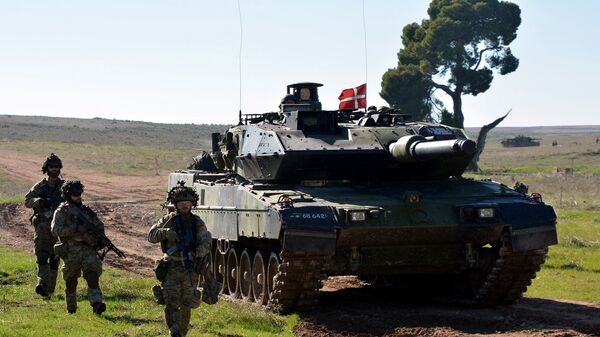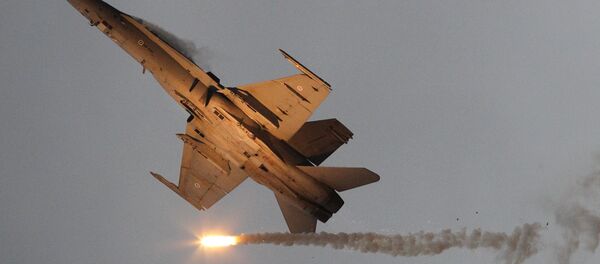The Danish government has voiced plans to boost the Nordic country's military budget by phasing in an extra DKK 12.8 billion ($2 billion) until 2023.
In the recent proposal set forth by Prime Minister Lars Løkke Rasmussen and Defense Minister Claus Hjort Frederiksen (both of the Liberal Party), the nation's defense budget will eventually be almost DKK 5 billion ($800,000) higher than it is today in what was described as a "substantial lift."
Løkke Rasmussen justified the proposal by claiming that Denmark was facing greater threats than before, whereas Hjort Frederiksen minced no words about what the threat was — the Russians, the usual bad guys.
"They are getting increasingly aggressive in their behavior, not least towards the Baltic countries. Russia is also increasingly engaging in military exercises, they are setting up missiles in Kaliningrad, which may potentially reach Copenhagen, Stockholm and the Baltic countries. This is just one of the things we must deal with," Claus Hjort Frederiksen told Danish Radio.
"The big challenge is that the armed forces have gone away from focusing on defense against the Russians to fighting the Taliban, but today prioritizing only one mission is no longer a luxury we can afford," Mikkel Vedby Rasmussen told Danish Radio.
Læs og se hvilke opgaver soldaterne fra @forsvaretdk løser i Afghanistan.https://t.co/8wfS8wtcq4#dkforsvar #værdatkæmpefor #dkpol pic.twitter.com/D0l4UGl1mQ
— Forsvaret (@forsvaretdk) October 2, 2017
Hjort Frederiksen emphasized that the new defense agreement will, contrary to its predecessors, will put a greater focus on the threat to Denmark and its NATO allies in the Baltic that Russia allegedly poses. To contribute its might to NATO's deterrence of Russia, the Danish government wishes to establish a 4,000 man strong brigade to be sent on international missions with six months' notice, in addition to the roughly 200 Danish soldiers headed to Estonia to protect their ally as part of a NATO spearhead force. To ensure this objective, Denmark plans to draft an extra 500 recruits each year.
We welcome Danish 200 soldiers arriving in Estonia January 2018 to support the presence of the allies here. #WeAreAllies #NATO pic.twitter.com/wX5uhyKmnm
— Estonian MFA (@MFAestonia) September 14, 2017
Additionally, the Danish frigates will have their capacity upgraded to be able to shoot down missiles potentially launched from Kaliningrad and offer protection against hostile submarines.
"I believe cyberattacks might prove as devastating to Denmark as direct military aggression. For instance, if people get to think we're unable to pay pensions, a nationwide panic would ensue," Claus Hjort Frederiksen said.
The government's initiative means that Denmark's defense expenditure jumps to 1.3 percent of the country's GDP, which is still a far cry from NATO's overall objective of 2.0 percent in 2024.
@forsvaretdk deltager med andre NATO-lande i øvelsen Brilliant Mariner. Læs Mission Update:
— Forsvaret (@forsvaretdk) October 13, 2017
https://t.co/jnSYNxxhzA#dkforsvar pic.twitter.com/DhuNBGV3VK
Major Steen Kjærgaard, an international security policy analyst at the Danish Institute of International Studies, DIIS, voiced fears of an underfinanced budget, contending ironically that "trees don't grow in the sky." He was backed by Kristian Søby Kristensen, senior researcher and deputy head of the Center for Military Studies at the University of Copenhagen, who also stressed that the financing must be ensured, Danish Radio reported.
Denmark, a nation of 5.5 million, maintains a conscription-based army of roughly 20,000 soldiers and a reserve of 55,000. However, because Denmark has a small and highly specialized military industry, the vast majority of the equipment used by the Danish Armed Forces is imported from NATO or fellow Nordic countries. Like Sweden and Finland, Denmark maintains the principle of "total defense." In late September, troops appeared on the streets of Danish cities in a bid to free up the police for counter-terrorism measures.
Soldater fra @forsvaretdk blev i dag indsat for at støtte politiet med bevogtning af mulige terrormål.https://t.co/GxW1Cly1dN#dkforsvar pic.twitter.com/Rupy4KVWla
— Forsvaret (@forsvaretdk) September 29, 2017





